Interview With Michelle Redo
 I first met Michelle Redo when she invited me and Nina Lichtenstein as guests on her podcast Daring to Tell to read from and talk about Awakenings. It was such a wonderful experience–I knew I needed to get to know her and her work better. I’m so glad I did and I’m equally grateful that Michelle agreed to do this interview for WomanPause! Readers, you are in for a treat!
I first met Michelle Redo when she invited me and Nina Lichtenstein as guests on her podcast Daring to Tell to read from and talk about Awakenings. It was such a wonderful experience–I knew I needed to get to know her and her work better. I’m so glad I did and I’m equally grateful that Michelle agreed to do this interview for WomanPause! Readers, you are in for a treat!
(And DO check out Daring to Tell’s next episode dropping this Tuesday with Jenn Hanson-dePaula, a media/publicity expert who’s run her own Book Marketing business for aa couple of decades–should be fascinating!)
Diane: Welcome, Michelle. I’m so excited to talk to you today!
I don’t think I’ve interviewed anybody who’s run a podcast before. I’m very tech challenged, so I want to start by saying I’m in awe of you.
Michelle: That’s very sweet. Don’t be.
Diane: I listened to your guest appearance on And So, She Left, (2023 Signal Award Gold Winner!) another podcast, featuring women who’ve left corporate jobs. I would love for you to share your story: You were in radio. You left. And then you moved from Boston to Maine.
Michelle: Yes! I started off as quite a young person in radio. I went to Northeastern University. Here I go—I’ll digress until the cows come home!
I began as an English major because I loved reading and writing. But I also loved music.
I sang in the chorus there and enjoyed it so much. It was my first exposure to classical music, and it had my heart. I was like, “Oh my god, this is amazing. I need to learn about this music more.” So, I became a music major.
What did I think I was going to do as a music major? I had no clue. And this is my story: I’ve always gone to the thing I felt most inclined towards without really knowing exactly what the plan was. Northeastern had a co-op program. I found out about a job at the classical radio station WGBH in Boston. And I thought, “Oh, that would be really cool.”
“I Was a Salad Girl. That Was the Title: Salad Girl”
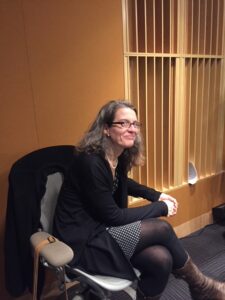 Because it’s WomanPause, I’ll share this—it’s funny. The day I had my interview, in July of 1987, I had really bad cramps, and I was like, do I really want to go to this interview? I almost blew it off and it became one of the most important days in my life. It sort of set so much for myself for 30 years.
Because it’s WomanPause, I’ll share this—it’s funny. The day I had my interview, in July of 1987, I had really bad cramps, and I was like, do I really want to go to this interview? I almost blew it off and it became one of the most important days in my life. It sort of set so much for myself for 30 years.
I loved the music but didn’t know what I could do with it. Luckily, I still followed that path and soon discovered I love production.
I worked for this live classical radio show, which is unheard of these days. We had live musicians into the studio four nights a week. It was the best thing ever. It was a great, great, great opportunity.
Diane: Wow! You go to things you’re drawn to, even though you don’t know what’s going to come of it.
Did you grow up in a household that supported that?
Michelle: I guess the short answer is yes. I remember my mom always saying, “You can be whatever you want to be. You can do whatever you want to do.” And I just didn’t really know what that was. I was in a small town that didn’t have a lot of great examples. I worked at a restaurant in high school. I was a salad girl. That was the title: Salad girl.
Diane: Put a little dressing on you and you’re good to go.
Michelle: Oh my god. I would go meet up with friends after and they’d be like, “You stink.” I smelled like onions and oil and vinegar.
I didn’t really know what I wanted, but I did know the things I liked, and my parents were, to their credit, very supportive of that.
“It Wasn’t Necessarily Courageous. It Was Sort of Naïve”
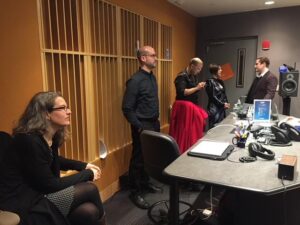 I didn’t have any of the restrictions that I know many parents can put on their kids. What to study. What field to go into. My mom didn’t have a lot of opportunities, and I think she wanted me to have more than she had. So she always encouraged me to do what I wanted to do.
I didn’t have any of the restrictions that I know many parents can put on their kids. What to study. What field to go into. My mom didn’t have a lot of opportunities, and I think she wanted me to have more than she had. So she always encouraged me to do what I wanted to do.
Diane: It takes a lot of courage to go forth in the darkness.
Michelle: It wasn’t necessarily courageous. It was sort of naive.
Diane: Naive can go a long way sometimes.
So you were in radio for 30 years?
Michelle: More than that. I started in ’87 as a co-op student. As I was doing the co-op stuff and working for that live classical music show, I had a very clear awareness that this was an amazing job and that after graduation, I was not going to have it as good for a while. And I was right. So once I graduated in 1990, I took two part-time production assistant jobs … one doing on-air promos and the other doing fundraising, like with the pledge drives.
Diane: Promo and fundraising are great skills to pick up along the way.
Michelle: Exactly. It was all entry level, and I learned a lot of stuff, but I wouldn’t have necessarily said that at the time.
“Feeling Around for What Resonates with Me Has Helped Me Find My Way Through My Career”
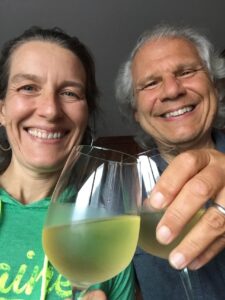 I did a lot of foundation building work that helps you see what goes on in a radio station 24 hours a day. It’s a lot of work. I had a lot to do with getting stuff ready for air, writing scripts, a lot of logistical planning. It all helped me become a very good producer. Eventually I moved up and put shows together. Directed live broadcasts. The on-air promotion was sort of my bread and butter for a very long time, but I got tons of other opportunities along the way. I produced a year of short format pieces about classical music in Massachusetts. Eventually I became the Creative Manager and led a little team who did promotion for two stations.
I did a lot of foundation building work that helps you see what goes on in a radio station 24 hours a day. It’s a lot of work. I had a lot to do with getting stuff ready for air, writing scripts, a lot of logistical planning. It all helped me become a very good producer. Eventually I moved up and put shows together. Directed live broadcasts. The on-air promotion was sort of my bread and butter for a very long time, but I got tons of other opportunities along the way. I produced a year of short format pieces about classical music in Massachusetts. Eventually I became the Creative Manager and led a little team who did promotion for two stations.
Diane: That’s great—and then you left.
Michelle: And then I left.
Diane: So tell me.
Michelle: My husband was going to be retiring in 2020, and we had talked about Maine for a long time because we had come on vacation here and loved it. I loved working at the radio station but it’s really intense when it’s on the air 24/7, continual flow of making sure everything’s right all the time. I enjoyed writing and thought our move would be a good chance for me to branch out. I was really not planning anything else that I was going to do. I was still kind of thinking to myself, “All right, well, we’re going to move, and I can figure it out.”
Sometimes I have trouble knowing what I really want. I stumble around. It’s in that exploration that I go, “Oh, I like this thing more, not that thing.” Feeling around for what resonates with me has helped me find my way through my career.
“I Like Learning Something from Stories and Seeing Growth in the Writer”
 I have these ideations of writing a memoir. So I started working with a writing coach, and she was doing a class called Publicity Powerhouse Workshop, a platform building for writers. She’d lead us through different things we could be doing: a blog, a newsletter, a podcast. And I thought, “Oh, I could do a podcast.” I know how to produce audio. And I love books and writing. I especially loved memoir. The other women in this class all either had a book or were working on a manuscript. So I had a whole bunch of people I could potentially have on my podcast at the ready.
I have these ideations of writing a memoir. So I started working with a writing coach, and she was doing a class called Publicity Powerhouse Workshop, a platform building for writers. She’d lead us through different things we could be doing: a blog, a newsletter, a podcast. And I thought, “Oh, I could do a podcast.” I know how to produce audio. And I love books and writing. I especially loved memoir. The other women in this class all either had a book or were working on a manuscript. So I had a whole bunch of people I could potentially have on my podcast at the ready.
Also, a few years before this I’d had gut surgery and I started listening to audiobooks. That’s the other big part of my story. I immediately found myself gravitating towards the ones that were narrated by the memoir writers themselves and started listening to them all the time.
Diane: Tell us about your podcast, Daring to Tell, where you interview memoir writers. How did you come up with the format?
Michelle: I remember looking in my journals where I wrote if I ever decided to have a podcast, I’d call it Daring to Tell, and I would talk with writers about their own work. That must have been when I was listening to the audiobooks.
I really love hearing other people’s stories about how they got through something really, really difficult. It’s a little bit of what we talked about on the Awakenings‘ episode, how you chose which essays to include from all the submissions. I like learning something from stories and seeing some kind of growth in the writer.
“I Do Think That Through Trial and Error, I’ve Learned How to Go More Towards Myself”
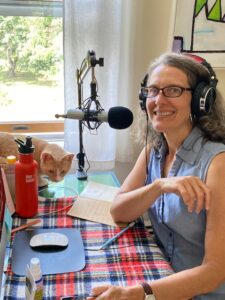 The format I have for the podcast includes the first part, where we talk mostly about writing, how the person might’ve gotten into writing, their writing story. And then they read their excerpt. I always am quite particular about which excerpt because I like to hear the things that resonate with me.
The format I have for the podcast includes the first part, where we talk mostly about writing, how the person might’ve gotten into writing, their writing story. And then they read their excerpt. I always am quite particular about which excerpt because I like to hear the things that resonate with me.
And like, “Here’s this really tough stuff. Let’s hear you read this part and then we’ll talk about that afterward.”
Diane: As you’re speaking, two words come to mind. One is trust. You may not know what you want, but you know what you like. And you trust that if you follow what you like, it’s going to bring you to a place that will be meaningful. To me, that’s a beautiful surrender. And it’s been a good journey. It’s taken you to places that really fill your heart.
Michelle: It’s funny, I love hearing you describe it back to me because I would never have been able to articulate myself that way. But yes, I do think that through trial and error, I’ve learned how to go more towards myself.
Diane: That’s wonderful. It’s a lesson we keep refining, but some people just seem to get it out of the gate. There’s always trial and error because sometimes you think you like something and it turns out, well, maybe not. But you have to have a certain amount of trust to follow what you like.
Michelle: I do think that this is the 50 plus part, honestly. It has taken me at least that many years to feel that I can trust what I like. When I was younger, I had plenty of happenstance amidst many other things that didn’t always work out.
“Memoir Is Hopeful”
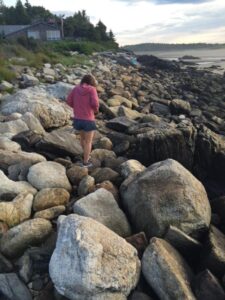 But it’s through that kind of stumbling off the path that has led me to say to myself, “Michelle, you’ve got to try and know what your own mind is. You do have to figure yourself out.” Because while there are times when I am pretty clear about what I like and what I don’t, there are plenty of other times when I’ve been like, “I don’t know. What do you think?”
But it’s through that kind of stumbling off the path that has led me to say to myself, “Michelle, you’ve got to try and know what your own mind is. You do have to figure yourself out.” Because while there are times when I am pretty clear about what I like and what I don’t, there are plenty of other times when I’ve been like, “I don’t know. What do you think?”
Asking anyone around me for their opinions. I am reminded of many examples of this, but the one I’ll use is when I was a kid at Thanksgiving dinner, one of the jobs that I was assigned was to go around and get everybody’s drink order. So I’d ask each person, “What do you want? What do you want? What do you want?” And list off all the options. When I got to my grandfather, he’d go, “Oh, I don’t know. What’s everybody else having?” And I think I have followed in that sort of inclination many times.
Diane: You do lots of positive reframing. You don’t necessarily search for silver linings in situations but, instead, find areas where growth took place. Not focusing on the crap that happened but on how people moved through and grew from challenges. I also look for growth, so I loved when you say in the And So She Left podcast that memoir is a hopeful genre.
Michelle: Memoir is hopeful, at least the ones I’ve read. If a person’s writing their own story, we know they’ve survived to write it. They got through something, somehow, and they want to tell you what it was. It usually is something quite unexpected or unusual. The truth is so interesting, compelling. You just can’t make this stuff up! That’s what I love.
“Listening Is the Most Underrated Thing We Can Do in the World”
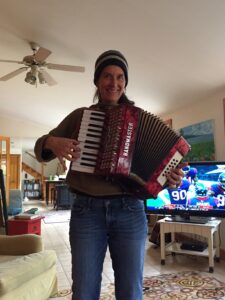 Diane: I love that, and sooooo appreciate your Daring to Tell! You also produce the podcast for Writing and Wellness Coach Nadine Kenney Johnstone: Heart of the Story!
Diane: I love that, and sooooo appreciate your Daring to Tell! You also produce the podcast for Writing and Wellness Coach Nadine Kenney Johnstone: Heart of the Story!
You are busy! But you have made time for a wonderful new project–helping writers do audio recordings of their memoirs. It makes total sense because you are musical and were in production for so many years. But even before you tell us about that project specifically, what is it about hearing the author that makes a difference?
Michelle: That is the best question ever. I was talking about this with my husband just yesterday. I muse about it all the time. There is nothing more personal, more unique, more alive than the human voice. When I connect with someone, I find it’s sort of my magnetic north. What is their voice like? Visual cues are important, but I think the voice transmits so much meaning. I just love listening to someone tell their own story. They were the ones in the room when the words were spoken, when the thing happened, when they had the realization about what it was, whatever it is, they experienced it. They wrote it. I want to hear their voice.
There was a memoir I had listened to early on. It was a very prominent woman who didn’t read her own memoir, and I couldn’t listen to it. I mean, the actress who did it did a fantastic job, but I thought, “But that’s not you.” There’s something just inauthentic about it, in the most basic way.
Diane: That’s fascinating.
Tell us about this project and what you’re loving about it. How do you help people tell their stories? How does that work?
Michelle: I have two simple words for that. I listen. Listening is the most underrated thing we can do in the world. I love listening. I love listening to audiobooks. I love listening to podcasts. I love listening to music. I am a listener.
“Making It Match Is Like a Patchwork Quilt Where You Never See Any Seams”
 It was an organic thing. Charlotte Maya was a guest on my podcast. After she and I finished recording, I said, “I noticed you don’t have an audiobook. Do you have any plans?” She said, “Oh, it’s funny that you say that because that actually, I‘d really like to narrate it myself.” So I said, “Well, I will say to you that I hope you get to read your own audiobook. If you’re looking for someone to produce [you narrating] it, I could not be more behind you doing it. But if that doesn’t work out, I’d love to work with you. And by the way, I’ve never produced an audiobook before, but I know how to do production.”
It was an organic thing. Charlotte Maya was a guest on my podcast. After she and I finished recording, I said, “I noticed you don’t have an audiobook. Do you have any plans?” She said, “Oh, it’s funny that you say that because that actually, I‘d really like to narrate it myself.” So I said, “Well, I will say to you that I hope you get to read your own audiobook. If you’re looking for someone to produce [you narrating] it, I could not be more behind you doing it. But if that doesn’t work out, I’d love to work with you. And by the way, I’ve never produced an audiobook before, but I know how to do production.”
I can be quite insecure about gazillions of things, but I amuse myself when I feel the amount of confidence I had when I said, “I know you can read a beautiful audiobook of your work.” She did. It’s all about being present. About just being there listening. It’s really hard to read and listen for hours and hours and hours and make it all match.
We change every day. I can go into the studio and record something one day, and the next day I go back and don’t sound the same. When you put those two pieces of audio next to each other, it’s not going to match up.
Diane: That’s wild.
Michelle: And when you have someone redo something because there was a noise in the background or there was a click, or they didn’t say the word properly or sometimes we say a different word than what we had written down, all these things have to fix and then punch back in. So making it match is like a patchwork quilt where you never see any seams.
(Sushi Tuesdays, pictured above, is available on Audible!)
“I Almost Think the Slower It Goes, the More I Love It”
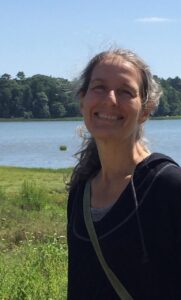 Diane: Wow. It’s such a production. And the goal is to make it look like it’s not right?
Diane: Wow. It’s such a production. And the goal is to make it look like it’s not right?
Michelle: Exactly. Like it’s nothing at all, which is just like anything in art.
Diane: How do you find people to help with their audios. Do you say to yourself I’d love to hear that person’s memoir in her own voice? Do you approach them?
Michelle: Charlotte was the first one I did. And because I have the podcast, I have the opportunity to talk with writers all the time. Which I love.
I’ve met a lot of people who have new books coming out. I’m working on an audio for one at this very minute is A Hard Silence with Melanie Brooks, who’d I’d known and so she approached me. Another writer, Margaret Mandell had seen a piece I wrote in Brevity blog where I mentioned the work I’m doing with audio, and she really wanted to read her memoir and approached me about it. I’m also working on her memoir called And Always One More Time. So I’ve met people who really want to read their own book, which I cannot endorse or support more. Audiobook work is not the glamour end of the industry. It’s really hard. So it’s hard, slow, laborious work that-
Diane: That fills your heart.
Michelle: It does. Yeah.
I almost think the slower it goes, the more I love it. I am the slowest person you’ll ever meet.
Diane: It reminds me of my favorite part of writing: revision—and then revising again.
Not because I have to get it perfect. That will never happen. It’s just like, “Oh, that’s not the word I want. Or that sentence—something’s off.” And I always read everything out loud because I have to hear it.
“When I Had Surgery, Literally, My Gut Changed”
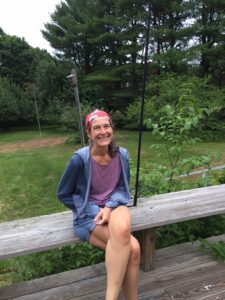 Michelle: It’s the best way to do it.
Michelle: It’s the best way to do it.
Diane: You mentioned that you want to write your memoir. Have you started?
Michelle: I have a messy first draft.
So it’s funny what you say about revising. That’s what I have to do. And sometimes we are the ones who are hardest pressed to take our own advice. Have I read my own words out loud yet? No.
Diane: Oh, but you will.
Michelle: That’s on the docket. Yeah.
I keep asking myself, what is it really about? What am I really trying to say? And I do think it’s about me trying to know what I really think and feel about things and how hard that is for me, and how it is a step and misstep and how it is this sort of grappling around to know. When I had surgery, literally, my gut changed. And that was this moment where I went, my gut is telling me things that I never even thought of before. Feeling things I’d never felt. I better start paying attention. It’s the paying attention. I just finished doing a round of pelvic floor PT. Maybe there are other 50 plus women out there who have had a lot of issues in this area. But my PT told me the best thing ever. She said, your gut is your second brain.
I started crying when she said that to me because I was like, oh my god, you’re right. If we don’t pay attention to that brain, what the hell are we doing here?
“I’ve Come to the Point Where It’s Scarier to Not Be on My Own Path”
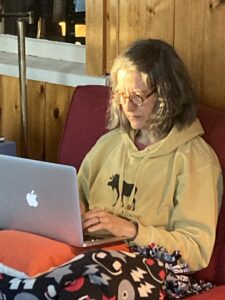 Diane: I think as women, it’s a little more challenging because we were kind of taught not to. Everybody else’s gut or needs are more important.
Diane: I think as women, it’s a little more challenging because we were kind of taught not to. Everybody else’s gut or needs are more important.
Michelle: Yes, yes, yes. Exactly.
Diane: I’m so excited for you.
I find this talking to you so inspiring because a question I often get from women in our age group is, what do I do now? They want something else, not necessarily a job or whatever. It’s that gut and learning to listen to what it’s saying and then to follow and trust and try.
Michelle: I feel so, so fortunate, thankful that I have this chance in my life to follow my own inclination. And I think it’s a really dicey thing. I am not a person that’s like, do it and everything will be great, because things are not always great. But I do think it’s important to spend time thinking about the thing that makes you sing.
Diane: Yeah, absolutely.
At times it won’t be easy and things won’t be smooth. But I think you probably trust you can deal with what comes.
Michelle: More so now than ever.
Diane: That’s the beauty of getting older too, I think.
We’ve dealt with many things and we’ve learned that we can deal.
Michelle: Right. And to go back to the fear that has driven so much for me? I’ve come to the point more now where it’s scarier to not be on my own path. I can’t not do a thing. And that’s where the courage to trust has come in.
As always, I’d love to hear from you. Please write a comment or send me an email.
See you soon!
XOXOXO
Diane



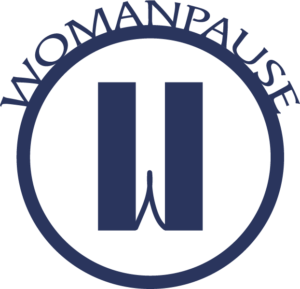
Diane, I see why you said I would love this. I totally get the finding your voice in memoir part! A great conversation. Thanks to both you and Michelle for a delightful, insightful conversation. I might be reaching out to you in the future Michelle-I’m soon to be co-authoring a memoir with a friend of mind. It would be great if the two of us did an audiobook together. Constance
Thank you, Constance! And I think you and Michelle would be the perfect pairing!!!
I didn’t want this interview to end! Thank you Diane and Michelle- it is so incredibly inspiring ! Reminds me of a quote I came across “do the thing that scares you the most”. I recently was brought to tears reading about the recent true story of a woman in New York City, a Financial Reporter for NY Magazine, who was scammed out of $50,000!! And, a few days later, I LISTENED to her read her own story as she had also recorded it for Apple News. It was so powerful to hear the writer speak hew own words. Thank you Diane for bringing such wonderful interviews for us to share. Maine! Sounds Dreamy!!
XO Marian
Oh, thank you, dear Marian!! Michelle is amazing–and so very inspiring! And I soooo look forward to the day that you have your speaking tour!!
Diane and Michelle, thank you for this awesome conversation! THIS: “I’ve come to the point more now where it’s scarier to not be on my own path. I can’t not do a thing. And that’s where the courage to trust has come in.” Michelle, I could not agree more. Bravo to you. It’s a joy to read and listen to women who are following this path of becoming more of themselves. I’ve wanted to record my memoir on audio for a long time but wanted to be sure it was done well. I will be contacting you about that because “…hard, slow, laborious work…” is my favorite (apparently!)
Sherry! You and Michelle would be match made in heaven!!!!!
I sensed that! You are a heaven-sent matchmaker for sure!
XOXO
Hi Sherry! Thanks so much for your comments. So glad my words resonated with you. I look forward to connecting about an audiobook possibilty!
I sent you a contact through your website. I love everything you said about this process and am excited to learn more!
Hi Diane, love this interview especially how Michelle talks about listening to your gut. When I healed my gut, my voice actually changed. I became more determined and fearless. I believe it gave me the courage to publish at 77. I write about it in my Substack, Get Gutsy. Thanks for such an interesting read, Trish
Trish! so good to hear from you, and thank you! Interviewing Michelle was wonderful! Wow about the changes you have also experienced after healing your gut! I love your fearlessness, and yay for that Substack–going to sign up right now!
Thank you so much Trish– I love hearing this. Bravo to you for your courage, your voice and your publications! No small feat, any of them. You may enjoy my most recent Daring to Tell episode with author Margaret Mandell… her first memoir comes out later this month and we talk a lot about finding a voice, and about how personal development occurs even more greatly late in life.